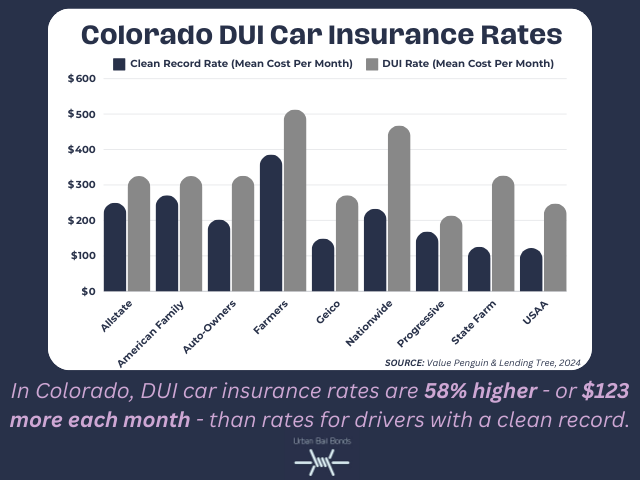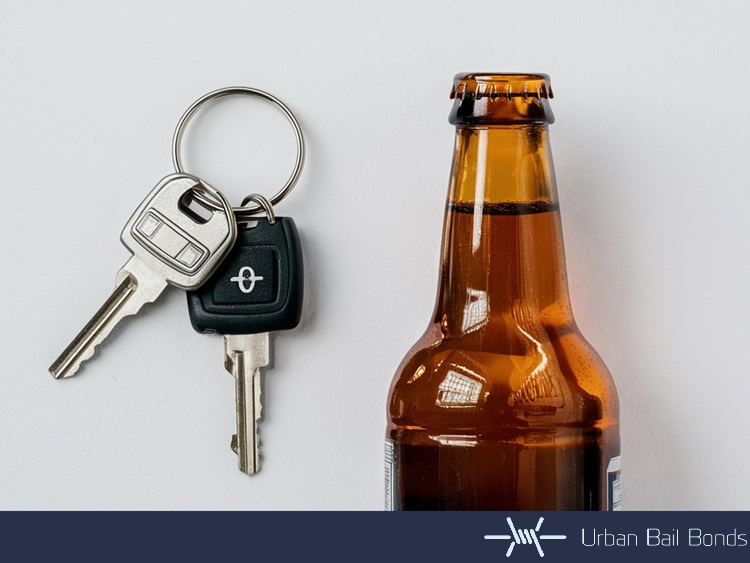Colorado DUI and DWI Guide
You often hear the terms DUI and DWI used interchangeably these days, which begs the question: are they the same thing? Both terms indicate that a driver is suspected of operating their vehicle in an impaired state. Beyond that, Colorado law makes distinctions between the two charges, and if you are facing DUI or DWI charges, it’s important to understand those distinctions. In this guide, the team atUrban Bail Bonds looks into the differences between a DWI and a DUI in Colorado.
Key Differences Between DUI and DWI
DWI is an abbreviation for “Driving While Intoxicated.” While it’s similar to DUI, the word “intoxicated” makes it clear that this charge is leveled against those who are driving while legally drunk. What constitutes legally drunk has changed over the years. As recently as the 1990s, if your blood alcohol content was less than 0.15%, you were considered okay to drive. Not anymore. Today, the maximum blood alcohol content is 0.08%, and there are movements underway to reduce it even further.
The acronym DUI is short for “Driving Under the Influence,” and is a more open-ended term than DWI. You might be under the influence of alcohol, or you might be under the influence of opioids or some other type of drug. And before you ask, yes, you can be charged with DUI if the police believe you are driving while high on weed.
Review the following table for a closer look at the differences between DWIs and DUIs – and the potential consequences of both charges under Colorado law.
| Aspect | DUI (Driving Under the Influence) | DWI (Driving While Impaired) |
|---|---|---|
| Legal Criteria | BAC of 0.08% or higher, or impaired by drugs/alcohol to a degree of unsafe driving | BAC of 0.05% to 0.079%, or showing signs of impairment by drugs/alcohol |
| Statutory Reference | Colo. Rev. Stat. § 42-4-1301(1)(a) | Colo. Rev. Stat. § 42-4-1301(1)(g) |
| Levels of Criminal Charges | Misdemeanor, Felony for 4th and subsequent offenses | Misdemeanor |
| Potential Punishments for First Offenders |
|
|
| Potential Punishments for Repeat Offenders |
|
|
| Aggravating Factors | BAC of 0.15% or higher | Minor in the vehicle |
| Driver’s License Consequences | Mandatory ignition interlock device for two years for repeat offenders | Possible ignition interlock device for high BAC |
| Alcohol Education Classes | Required for all offenders | Required for all offenders |
| Conditions for Felony Charges | 4th offense: Class 4 Felony Punishable by 2 to 6 years in prison and a fine of $2,000 to $500,000 |
Not applicable |
| Lookback Period for Prior Offenses | Lifetime | Lifetime |
The laissez-faire attitude toward drinking and driving that prevailed in the mid-to-late 20th century is long gone. As experienced Colorado bail bond agents, we can say without hesitation that DUI and DWI are both serious charges. In the case of a DWI conviction, you can expect to lose your license for a year. But that’s not all. A DUI or DWI conviction can also involve stiff financial penalties, probation, a spike in your insurance rates, and even up to 1 year of jail time, particularly if you have been convicted more than once.
Definition of “Impairment”
When it comes to driving, impairment may be caused by alcohol or some other type of drug (even prescription drugs). A person is generally considered to be impaired if they are operating a motor vehicle on a public roadway, they are under the influence of an impairing substance, they have a blood alcohol content of 0.08% or greater, or they have any amount of a Schedule I controlled substance in their blood or urine.
Keep in mind, however, that if the arresting officer determines your mental or physical abilities have been, in their judgment, “noticeably impaired,” they are within their rights to charge you with a DUI regardless of whether your blood alcohol level exceeds the legal limit (although it may be more difficult for the state to prove its case in court).
Penalties for DWI and DUI in Colorado
Driving under the influence of alcohol or drugs is one of the surest ways to bring down the weight of the justice system on you. People always contact us looking for affordable bail bonds after being arrested for operating. In contrast, intoxicated or impaired, and even if they can secure a speedy bond, their lives often suffer major disruptions for years afterward. That’s the biggest penalty someone pays for driving while impaired.
From a strictly legal standpoint, a first-time offense can result in a fine of up to $1,000 and up to one year in jail. And as we mentioned earlier, your license will also be suspended for one year. With each subsequent DUI or DWI, the fines will typically get larger, the jail time more prolonged, and the long-term repercussions more severe.
Is There Any Way to Beat A DWI or DUI Conviction?
Colorado had a high conviction rate for DUI charges (88%), with increasing convictions for charges associated with high Blood Alcohol Concentration (BAC) results (96%), high Delta 9-THC results (92%), and high polydrug results (92%).
—SOURCE: Colorado Department of Public Safety – 2021 Report
The best way to avoid DWI or DUI charges is not to drive while impaired. That said if the police have cited you for driving under the influence or driving while intoxicated. The arrest was based not on your blood alcohol level or some other quantifiable metric but on their belief that you were noticeably impaired. You may stand a chance of prevailing in court, but it will not be easy.

Download a PDF of the Infographic Above:
In addition, if the police believed you were drunk and you refused to take a breathalyzer as a way to get around the charge, you may avoid conviction for driving while intoxicated. Still, you must pay the penalty for refusing the breath test. That can include a hefty fine and a one-year suspension of your license. And that’s not all.
If you refuse a breath test, you will be required to complete an alcohol and drug treatment and education program, and the label of “persistent drunk driver” (PDD) will be attached to your permanent record, which may very well affect your ability to get certain kinds of jobs.
You will also likely see a steep increase in car insurance rates. Colorado drivers with a DUI pay an average of $123 more per month for car insurance than those with a clean record. And if you currently drive as part of your job, you may lose that job. If you are a foreign national working legally in the US, a DUI or DWI could lead to a revocation of your visa and deportation.

